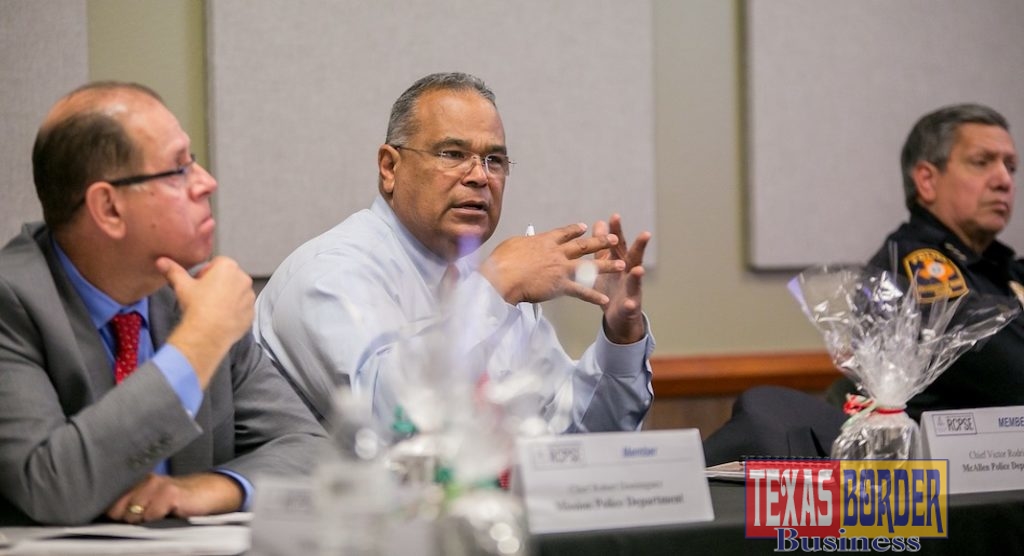
Texas Border Business
Throughout 2018, law enforcement professionals have coordinated with STC to develop a functioning action plan as the Regional Center for Public Safety Excellence gets underway.
McAllen, Texas – A working partnership to develop South Texas College’s Regional Center for Public Safety (RCPSE) is a first in Texas, and will serve as a model for future law enforcement to follow, according to Kim Vickers, Executive Director for the Texas Commission on Law Enforcement (TCOLE).
Vickers facilitated STC’s third President’s Advisory Council State Local Law Enforcement Committee meeting for the first time on Dec. 13. The committee meeting was organized to identify strategies that will be used in the development of the college’s 2020 RCPSE implementation plan.
TCOLE, which serves as the regulatory agency for peace officers in Texas facilitated the retreat and reviewed the three goals decided upon by law enforcement at the committee meeting.
Goals include developing and delivering 10 specialized skills courses that meet the unmet needs of state, local and federal law enforcement by Aug. 31, 2019; building a partnership with the Federal Law Enforcement Training Center (FLETC) and law enforcement agencies by 2020; and having the RCPSE assist agencies in recruiting and developing skilled individuals in the field of public safety.
“You have an opportunity here because of the number of federal officers, which makes it available, but I have not seen this anywhere else, maybe in other parts of the country there may be, but I know there is nothing like this in the state,” Vickers told committee members. “The partnership between the locals which also includes state and federal components is very unique and very positive for the Valley. I think it’s a great idea.”
Vickers was in attendance along with representatives from federal agencies including Laredo Field Operations Director of Southern Operations Carlos Rodriguez; Chief Superior for Hidalgo, Pharr, and Anzalduas Efrain De Los Santos; Acting Chief Patrol Agent Raul L. Ortiz; and Acting Deputy Chief Lloyd M. Easterling.
Representing local police departments on the Council was McAllen Chief Victor Rodriguez; Mercedes Chief Olga Maldonado; Mission Chief Robert Dominguez; Pharr Training Coordinator Sgt. Miguel Reyes; and Assistant Weslaco Chief Raul Lopez.
Law enforcement professionals are coordinating with STC to develop a functioning action plan as the STC RCPSE gets underway. The college held an official ribbon cutting announcing the opening of the facility in September 2018.
The Council now serves as the principal means to develop advanced training programs at the RCPSE and to ensure that those programs remain current despite changing conditions.
“This particular meeting was a committee meeting, which was then broken up among federal, state, county and local law enforcement,” said STC RCPSE chief administrator Paul Varville. “We discussed moving forward. We have a lot of ideas and conducted a survey where we asked both federal and state entities what kind of training they wanted. They ended up submitting 6,732 requests for training slots just among the members of our advisory board.
“During the committee meeting today, we were able to identify the specific types of training including mandatory training required by the state,” Varville said. “We need to help all of the officers in the Valley to be trained and address the more advanced courses including cyber technology. ”
Earlier this year, STC President Dr. Shirley A. Reed extended an invitation to leaders of the law enforcement community for inclusion on the Advisory Council. The Council was created to provide regular input and recommendations for professional continuing education and degree programs.
The $71.28 million long-range master plan—that will transform the regional center to a Public Safety, Law Enforcement, Fire Science, and Homeland Security Campus by 2030—is on a 64-acre site, in Pharr, Texas with 180 additional acres available for future expansion. The Master Plan will include 534,385 square feet of buildings, structures and driving track, and will be completed in three phases over the next decade.
Dr. Reed said STC has made incredible progress with the RCPSE even though it has taken more than a decade to establish.
“We have an agreement on an MOU with FLETC in that their basic training can be articulated into continuing education credits,” Dr. Reed told committee members at the meeting. “This is a way for anyone who has been through the FLETC training to go through the process of evaluating some of the training they have experienced and actually earn college credit for it.
“They were very excited about this opportunity, and it’s a great way for officers to be on the path for additional college credit,” Dr. Reed said. “We were surprised how excited and eager they were to move in this direction.”












